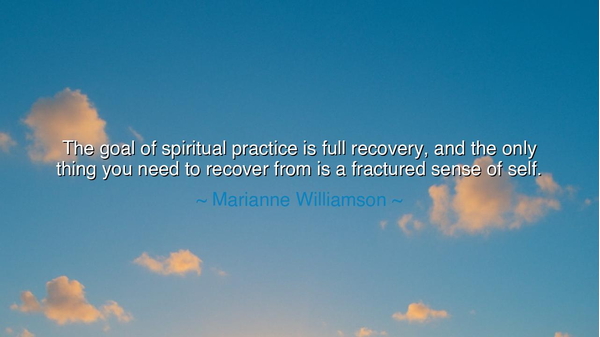
The goal of spiritual practice is full recovery, and the only
The goal of spiritual practice is full recovery, and the only thing you need to recover from is a fractured sense of self.






Hear the profound voice of Marianne Williamson, who has walked the path of soul and healing, declaring: “The goal of spiritual practice is full recovery, and the only thing you need to recover from is a fractured sense of self.” These words strike at the very heart of human suffering. For what greater wound exists than the loss of wholeness within? The wars outside us are but shadows of the war inside—the struggle between who we are in truth and who we have come to believe ourselves to be. The aim of every true path, whether prayer, meditation, or service, is not to make us other than we are, but to restore us to the fullness we have always been.
A fractured sense of self is the root of despair, the whisper that says we are unworthy, incomplete, or broken beyond repair. It is born when we are torn between masks demanded by the world and the authentic soul within. This fracture leaves us restless, seeking identity in possessions, in power, in the fleeting approval of others. But Williamson reminds us that the journey is not to become something new, but to recover what was lost—the unity of the soul, the remembrance of our true nature.
The ancients knew this secret well. The Delphic oracle’s command, “Know thyself,” was not merely philosophy but salvation. Socrates sought truth not in riches nor conquest but in turning inward, guiding others to see that wisdom is remembrance of the soul’s essence. In the East, the sages of India spoke of yoga as union—the healing of the divided self, the mending of the fracture between body, mind, and spirit. Across the ages, all paths converge on this: recovery of the wholeness already within.
Consider the life of Siddhartha, who became the Buddha. Born a prince with every comfort, he left it all when he realized that no external power could cure the suffering within. His years of wandering, fasting, and meditating were not about becoming someone else, but about uncovering what had always been there: the truth of enlightenment, the harmony of the self awakened. His story is the perfect mirror of Williamson’s teaching: spiritual practice is recovery, not invention.
So too in our daily lives, we may see this wisdom. A soldier scarred by war may believe he is only brokenness, yet when he turns to healing, he discovers compassion, strength, and wisdom beneath the wound. A woman betrayed in love may think she has lost herself, yet through prayer, art, or reflection, she finds not a stranger, but the true self waiting patiently to be remembered. The fracture was never the end—it was the beginning of recovery.
The lesson, O seeker of truth, is clear: do not chase endlessly after becoming something other. Instead, seek to remember what you already are. Spiritual practice is not about perfection, but about reunion—the mending of what was split, the return of what was lost. Look inward, not outward, for in the stillness of your heart you will find the self that has always been whole, waiting for your recognition.
Practical steps are these: practice silence each day, that the noise of the fractured mind may calm. Write your thoughts, not to invent yourself, but to see where the fracture lies. Forgive yourself, for guilt is one of the sharpest blades that cuts the soul apart. Meditate, pray, or walk in nature—not to escape the self, but to recover it. Each small act of love toward yourself is a step toward wholeness.
Thus remember Williamson’s wisdom: the only thing you must recover from is a fractured sense of self. You are not broken beyond repair. You are not less than whole. The goal of your spiritual journey is to gather your fragments, to unite them with compassion, and to walk forward not as a half-remembered shadow, but as the radiant, whole being you were always meant to be.






AAdministratorAdministrator
Welcome, honored guests. Please leave a comment, we will respond soon